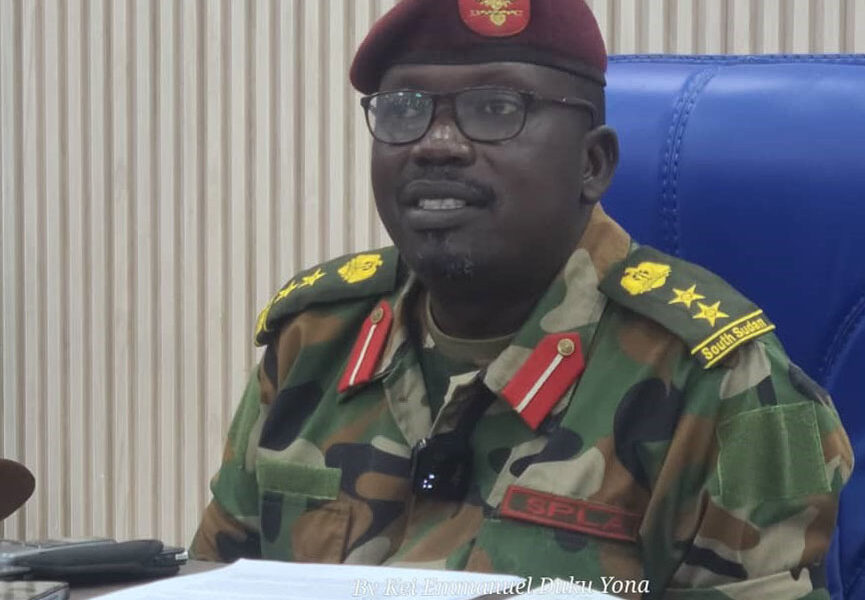By Kei Emmanuel Duku
Sudan People’s Liberation Army-In-Opposition (SPLA-IO) is skeptical over integration of forces due to sluggish implementation of 2018 peace agreement’s provisions.
SPLA-IO), Spokesperson Col. Lam Paul Gabriel said unification and deployment provisions of the peace agreement have not fully been implemented.
Recent intensified clashes between the South Sudan People’s Defense Forces and SPLA-IO in different parts of the country, have only widened the rift among the forces to be integrated.
The animosity, like the latest clashes in Western Equatoria State, has caused loss of lives and displacement in some parts of the country.
According to local authorities, property, worth millions of South Sudanese pounds burnt when a market between Nagero County and Kobribu was set aflame during a clash.
Civilians were shot and killed in cold blood, markets looted, and health facilities destroyed—as inhuman and a violation of human rights.
Speaking to journalists on Thursday, Col. Paul cited unresolved issues, including disagreements over command structure, troop deployment, and implementation of security arrangements, as reasons for their stance.
He argued that the 2018 peace agreement addresses the unification of forces, but not the integration of different rebel factions into a single national army.
“This agreement does not mention integration of forces,” Col. Paul stated. “There is a misconception within the SSPDF that SPLA-IO forces are supposed to be integrated into the current SSPDF. This is not in the agreement. No SPLA-IO soldier will be integrated into the current SSPDF.”
He explained that, according to Article 2.2.5 of the Transitional Agreement to Resolve the Conflict in the Republic of South Sudan on security arrangements, the Revitalized Transitional Government of National Unity (RTGONU), once formed, will have equal representation on the Joint Transitional Security Committee (JTAC), with half of the members coming from the government and the other half from opposition parties, primarily the SPLM-IO and the South Sudan Opposition Movement (SSOM).
Col. Paul further stated that the only national army the country currently has is the unified force that graduated in 2022 and those subsequently deployed.
The remaining forces are still considered party forces, and those belonging to the SPLM-IO will not be integrated into the national army.
He noted that Articles 2.1.3 and 2.1.4 of the peace agreement refer to the various groups of soldiers as “party to the force, force to the party, or forces loyal to the agreement.”
He reiterated that the SPLA-IO remains committed to the peace agreement, but believes that genuine integration can only occur when all parties agree and are ready to implement the agreed-upon terms.
“We currently have party armies, whether SSPDF or SPLM-IO, controlling parts of this country. These forces will operate as a single unit after unification. Without completing the unification process, no one should claim to be part of a national army unless they have gone through that process,” Col. Paul stated.
The SPLA-IO spokesperson called on stakeholders to the 2018 peace agreement to recognize the importance of implementing the security arrangements, rather than engaging in unnecessary conflicts that destabilize the country and inflict further suffering on innocent civilians.
He also appealed to the Ceasefire and Transitional Security Arrangements Monitoring and Verification Mechanism (CTSAMVM) and the Joint Defense Board Verification Mechanism (JDBVM) to investigate the recent alleged attack on an SPLM-IO site in Western Equatoria State by SSPDF forces, which reportedly resulted in property destruction, displacement, and loss of life, and to hold those responsible accountable.




